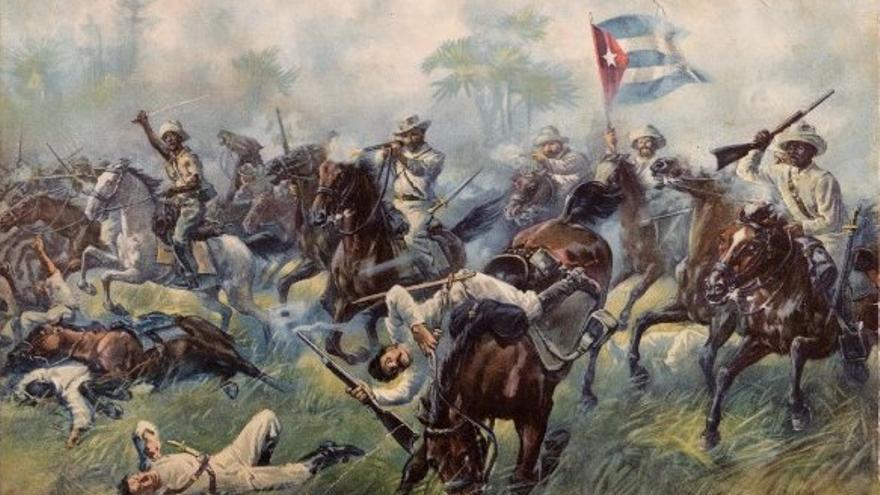
![]() 14ymedio, Yunior García Aguilera, Madrid, September 27, 2023 — By 1877, the Ten Year’s War was was at an impasse. The Spanish had not managed to defeat the Cuban guerillas and the insurgents were nowhere close to a decisive victory. The Army of Liberation was riddled with internal strife, plagued by regional divisions, defeatism and poor discipline.
14ymedio, Yunior García Aguilera, Madrid, September 27, 2023 — By 1877, the Ten Year’s War was was at an impasse. The Spanish had not managed to defeat the Cuban guerillas and the insurgents were nowhere close to a decisive victory. The Army of Liberation was riddled with internal strife, plagued by regional divisions, defeatism and poor discipline.
Vicente García, who had led a seditious revolt in Santa Rita, refused to abandon his territory to join the western invasion. Holguín declared itself an “independent canton” outside the control of the Republic in Arms. And the secretive Republican Unity society in Las Villas was unaware that Gómez and Maceo were leading the war effort. The Cubans were also dealing with a chronic shortage of military hardware, lack of support from the Cuban emigré community and an intelligent enemy in the guise of the new captain-general.
Martínez Campos, a military officer from Segovia, had been a professor at the General Staff School and was the leader of the1874 military coup in Spain. There he was known as the man from Sagunto who restored the Spanish monarchy, famously proclaiming Alfonso XII king of Spain under a carob tree.
But conditions in Cuba were such that the Spanish also found themselves unable to prevail in the conflict. With an army that was ill-prepared, even more badly dressed, and poorly fed, nine out of ten soldiers were being felled by yellow fever and other tropical diseases, not guerilla machetes. The idea of signing a peace deal was in the minds of the combatants on both sides.
However, a law prevented the insurgents from even mentioning the subject. The Spotorno Decree, adopted by the House of Representatives of the Republic in Arms, proscribed the death penalty for anyone, Cuban or Spanish, who turned up on the battlefield talking about peace.
Then a singular character showed up in Havana: William Pope. He claimed to be a member of the “Peace Council”, bishop-elect of Haiti and envoy of the U.S. secretary of state. His mission was to meet with the insurgent leaders and negotiate the controversial capitulation.
One cannot talk about peace in today’s Cuba. The regime subjugates its citizens with an iron fist. Prison and exile are the predictable outcomes for anyone who dares to raise his or her voice
The meeting took place secretly on May 11, 1877, at the governmental headquarters of the Republic in Arms. The then-president, Estrada Palma, was rumored to have annexationist ideas. At the meeting there was talk of paying Spain a figure of between 100 and 150 million pesos to buy independence. That money, of course, would be lent by the United States. And although it was not entirely clear to the rebels, the seeds of ending the war without having defeated the enemy had been sown.
It is said that Bishop Pope later met with Martínez Campos, who told him he was not authorized to accept such a proposal, urging him to instead travel to Madrid and present it to senior government officials. Pope celebrated a military mass in Santiago de Cuba’s cathedral, where he was given a bishop’s ring by the captain general.
But this is where the story gets murky. It turns out that Pope was not American after all but Irish. Nor was he a bishop, just a priest with outsized ambitions. The man apparently dreamed of distinguising himself by playing mediator in some important affair and, perhaps, serving as bishop of Havana. Years later, Máximo Gómez would find him in a Honduran prison, convicted of stealing some religious vestments and a Holy Communion chalice.
In December, 1877, the House of Representatives overturned the Spotorno Decree, paving the way for the Pact of Zanjón, which was was signed on February 10 the following year. Antonio Maceo famously rejected the treaty in a document known as the Baraguá Protest. He would acknowledge shortly thereafter, however that the conditions necessary for carrying on the fight were not there. The Bronze Titan was forced to negotiate with Martínez Campos for a letter of safe conduct out of the country to exile in Jamaica.
Enrique Collazo would write, “The Cuban people, deaf for ten years to our cries of glory and agony, watched impassively as the revolution died, drowned in the blood of its martyrs.” It was the end of a long war that fizzled out without achieving its basic objectives.
One cannot talk about peace in today’s Cuba. The regime subjugates its citizens with an iron fist. Prison and exile are the predictable outcomes for anyone who dares to raise his or her voice or engages in even the most peaceful of protests. And though there is no Martínez Campos in the government, ready to negotiate, there is no shortage of Popes who talk falsely of bridges, of peace, of love.
____________
COLLABORATE WITH OUR WORK: The 14ymedio team is committed to practicing serious journalism that reflects Cuba’s reality in all its depth. Thank you for joining us on this long journey. We invite you to continue supporting us by becoming a member of 14ymedio now. Together we can continue transforming journalism in Cuba.
